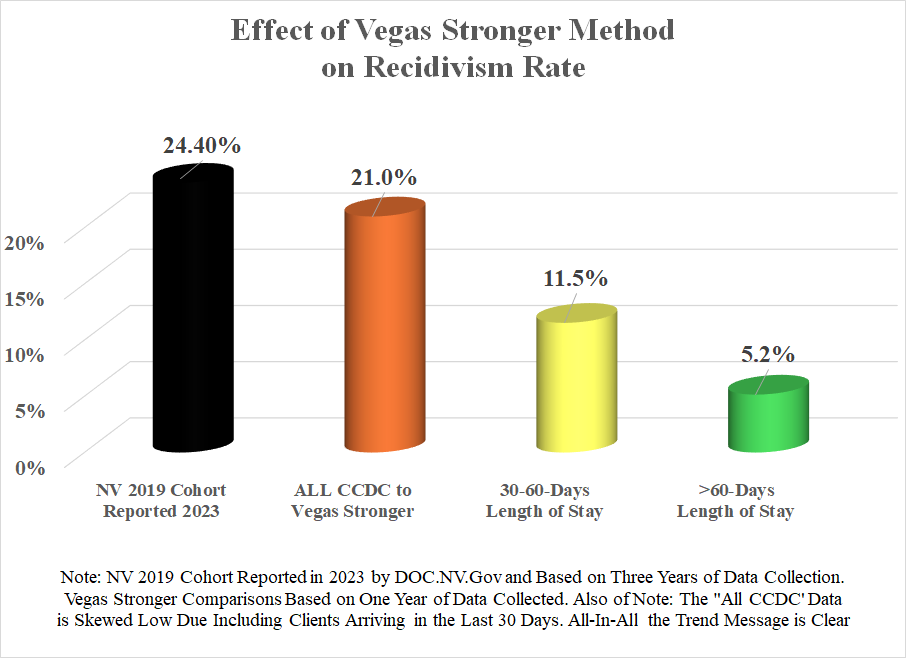
13 Elements of the Vegas Stronger Method
- Counseling -- Group, Individual and Psychiatric Services
- Drug Testing
- Primary Medical Care
- Medication Assisted Treatment & Recovery
- Peer Recovery Coaching
- Recovery Meetings
- Case Management -- Insurance, Critical Documents
- Vocational Training & Work Therapy
- Housing - from Shelters to Affordable Housing
- Fitness -- Yoga, Full Gym, Boxing
- Self-Care Salon Services
- Nutritional Services
- Becoming of Service to Others

Note: NV 2019 Cohort Reported in 2023 by DOC.NV.Gov and Based on Three Years of Data Collection. Vegas Stronger Comparisons are Based on Only One Year of Available Data Collected.
Also Note: “All CCDC” Data is Skewed Low by Inclusion of Clients Arriving in the Last 30 Days.
However, the Overall Trend Message is Clear.
The services provided via the Vegas Stronger Method include PHP, IOP and OP groups as well as medication management and related psychiatric evaluations for clients with cooccurring mental health issues. Each client receives an individualized treatment plan. Therapists and case managers work with each client on relapse prevention, family issues and successful reintegration in society. Labs to measure drug and alcohol use are pulled regularly and relapses reported to the client’s therapist to work through. Trauma informed care at Vegas Stronger includes therapeutic methods such as CBT, DBT, MRT and Contingency Management as well as the holistic methods of yoga, art therapy, and mindfulness practices. Two Psychiatric Nurse Practitioners and a Family Practice Nurse Practitioner provide a more intense regimen of health and wellness interventions.
Case Management, augmented with Peer Support Specialists, is a fundamental and essential service that provides the cohesion reentering clients need. Primary importance is placed on ensuring each client has a bed within a network of well vetted sober living and transitional housing facilities. Case Managers work with clients individually and address each person’s needs for essential documents, insurance coverage, ongoing legal issues, job placement and vocational rehab as well as coordinating meetings with social service agencies and referrals to outside providers at the direction of the Nurse Practitioners and Therapists.
Collaboration between DSD and Vegas Stronger has been strong since inception of the program. Staff are in touch daily and the interdisciplinary team meets on a weekly basis. Pre-release services have developed well, with in-reach taking place regularly. The development of a “warm hand-off” process has helped to improve the referral-to-admission numbers. When clients are released to the street at midnight the opportunity for immediate relapse is very high. Vegas Stronger provides transportation directly from CCDC to treatment, vastly increasing the odds of success. Worth noting, transportation is also provided on a daily basis from wherever the client lives to treatment at the Vegas Stronger facility.
Through March there have been 74 individuals referred, 51 clients have been admitted and 32 have remained actively engaged throughout – a 62.7% Retention Rate. For the entire cohort there have been a total of 2,475 days in treatment, an average length of stay (ALOS) being 48.5 days per enrolled client. While nearly 50 days in treatment is a strong number, the ALOS will increase substantially as the program matures (many actively engaged clients included in the ALOS calculation have only recently arrived, pulling the average down).
Data is collected and currently being compiled on a number of broader metrics. Follow up at six months and a year will take place as it ripens (circa July/August to begin). Recidivism rates will continue to be calculated and refined. Also, medication adherence, occurrence of relapse and housing stability over time will be measured. Survey data will be forthcoming related to reduction in substance use, employment status, perceived quality of life and overall client satisfaction.







